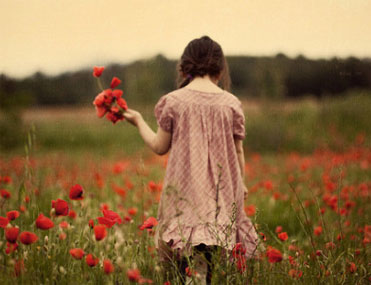Robert Burns经典爱情诗歌《A Red Red Rose》

这首诗是诗人流传最广的一首诗出自诗人的《主要用苏格兰方言写的诗集》。诗人在诗中歌颂了恋人的美丽表达了诗人的炽热感情和对爱情的坚定决心。一首诗歌的长久流传不仅仅是因为其中美妙动听的韵律还因为诗歌中所蕴含的深远含义。
A Red Red Rose 红玫瑰 by:Robert Burns
O, my Luve's like a red, red rose
That's newly sprung in June;
O, my Luve's like the melodie,
That's sweetly play'd in tune.
As fair art thou, my bonnie lass,
So deep in luve am I;
And I will luve thee still, my dear,
Till a' the seas gang dry.
Till a' the seas gang dry, my dear,
And the rocks melt wi' the sun;
I will luve thee still, my dear,
While the sands o' life shall run.
And fare-thee-weel, my only Luve!
And fare-thee-weel, a while!
And I will come again, my Luve,
Tho' 'twere ten thousand mile!
红玫瑰
郭沫若 译
吾爱吾爱玫瑰红,
六月初开韵晓风;
吾爱吾爱如管弦,
其声悠扬而玲珑。
吾爱吾爱美而殊,
我心爱你永不渝,
我心爱你永不渝,
直到四海海水枯;
直到四海海水枯,
岩石融化变成泥,
只要我还有口气,
我心爱你永不渝。
暂时告别我心肝,
请你不要把心耽!
纵使相隔十万里,
踏穿地皮也要还。
注释:
1.luve 苏格兰方言,= love, 注意大写L,表达了“重要”和“唯一”的内涵。
2.melodie 来自法语,是19、20世纪法国从德国的抒情歌曲学来的,它是带伴奏的艺术歌曲。19世纪的melodie一般用严肃抒情诗做歌词,由钢琴伴奏的独唱演员演唱。Melodie 的特点是诗歌与音乐的完美统一。因此,melodie 准确地说不是“乐曲”、“曲调”,而是“歌曲”。
3.play'd = played 诗歌用字
4.art 古英语,第二人称系动词, = are
5.thou 古英语, 第二人称主格, = you
6.bonnie 苏格兰方言,健康的,美丽的,可爱的,可人的
7.lass 年轻未婚女子,姑娘;多数用于非正式对少女的称呼;因与lassie有关,所以也有女性恋人的意思
8.a' 诗歌语言, = all
9.gang 苏格兰方言, = go
10.wi' 诗歌语言, = with
11.thee 古英语,第二人称宾格, = you
12.o' 诗歌语言, = of
13.fare-thee-weel 诗歌语言, = (bid)farewell (to)thee
14.tho' 诗歌语言, = though
15.'twere 诗歌语言, = it were (起到省略一个音节的作用)

这首诗是诗人流传最广的一首诗出自诗人的《主要用苏格兰方言写的诗集》。诗人在诗中歌颂了恋人的美丽表达了诗人的炽热感情和对爱情的坚定决心。一首诗歌的长久流传不仅仅是因为其中美妙动听的韵律还因为诗歌中所蕴含的深远含义。
A Red Red Rose 红玫瑰 by:Robert Burns
红玫瑰
郭沫若 译
吾爱吾爱玫瑰红,
六月初开韵晓风;
吾爱吾爱如管弦,
其声悠扬而玲珑。
吾爱吾爱美而殊,
我心爱你永不渝,
我心爱你永不渝,
直到四海海水枯;
直到四海海水枯,
岩石融化变成泥,
只要我还有口气,
我心爱你永不渝。
暂时告别我心肝,
请你不要把心耽!
纵使相隔十万里,
踏穿地皮也要还。
注释:
1.luve 苏格兰方言,= love, 注意大写L,表达了“重要”和“唯一”的内涵。
2.melodie 来自法语,是19、20世纪法国从德国的抒情歌曲学来的,它是带伴奏的艺术歌曲。19世纪的melodie一般用严肃抒情诗做歌词,由钢琴伴奏的独唱演员演唱。Melodie 的特点是诗歌与音乐的完美统一。因此,melodie 准确地说不是“乐曲”、“曲调”,而是“歌曲”。
3.play'd = played 诗歌用字
4.art 古英语,第二人称系动词, = are
5.thou 古英语, 第二人称主格, = you
6.bonnie 苏格兰方言,健康的,美丽的,可爱的,可人的
7.lass 年轻未婚女子,姑娘;多数用于非正式对少女的称呼;因与lassie有关,所以也有女性恋人的意思
8.a' 诗歌语言, = all
9.gang 苏格兰方言, = go
10.wi' 诗歌语言, = with
11.thee 古英语,第二人称宾格, = you
12.o' 诗歌语言, = of
13.fare-thee-weel 诗歌语言, = (bid)farewell (to)thee
14.tho' 诗歌语言, = though
15.'twere 诗歌语言, = it were (起到省略一个音节的作用)
O, my Luve's like a red, red rose
That's newly sprung in June;
O, my Luve's like the melodie,
That's sweetly play'd in tune.
As fair art thou, my bonnie lass,
So deep in luve am I;
And I will luve thee still, my dear,
Till a' the seas gang dry.
Till a' the seas gang dry, my dear,
And the rocks melt wi' the sun;
I will luve thee still, my dear,
While the sands o' life shall run.
And fare-thee-weel, my only Luve!
And fare-thee-weel, a while!
And I will come again, my Luve,
Tho' 'twere ten thousand mile!

